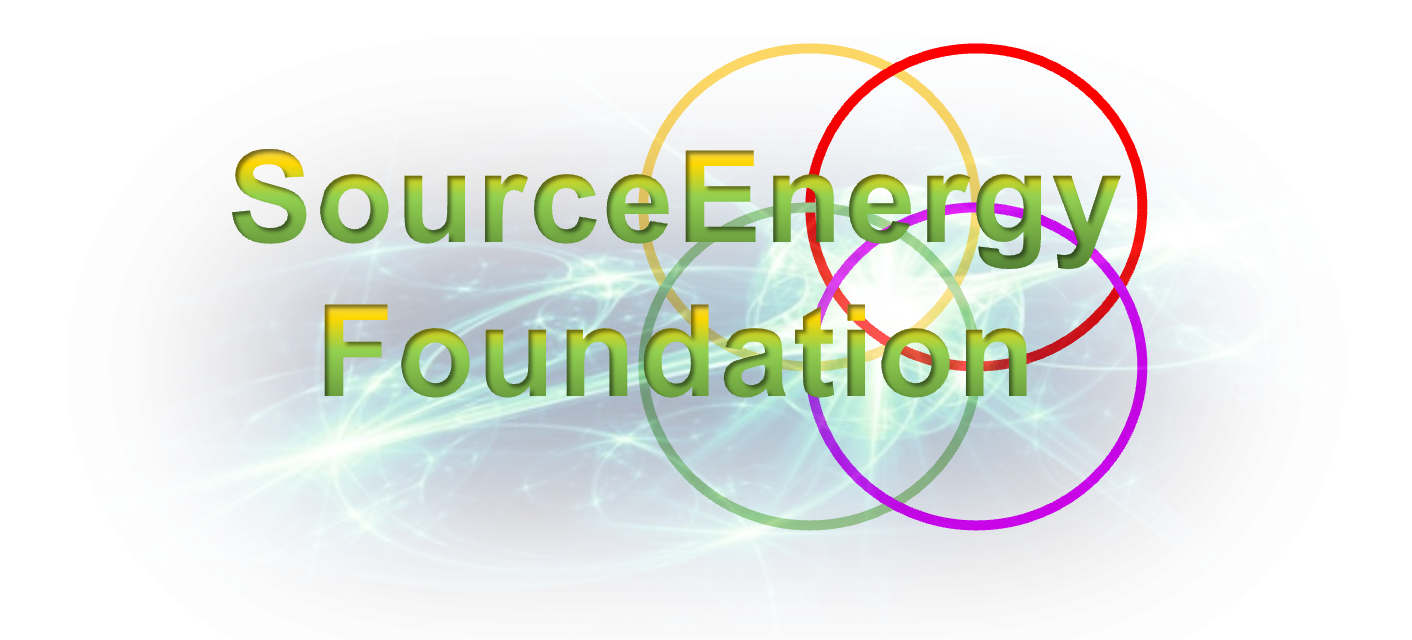The Middle Passages
Micah Chapter 1: A Call to Sustainable Transformation
- “The word of the Lord that came to Micah of Moresheth in the days of Jotham, Ahaz, and Hezekiah, kings of Judah, which he saw concerning Samaria and Jerusalem.” This opening declares a vision that transcends the immediacy of local politics, aligning with the Wealth Ecology Model by promoting a timeless message of stewardship and ethical governance.
- “Hear, all ye people; hearken, O earth, and all that therein is: and let the Lord God be witness against you, the Lord from his holy temple.” The call for the earth and its inhabitants to listen emphasizes the global and inclusive nature of the Wealth Ecology ethos, which upholds the Earth as a witness to human actions.
- “For, behold, the Lord cometh forth out of his place, and will come down, and tread upon the high places of the earth.” This verse can be seen as a metaphor for the disruptive potential of the Wealth Ecology Model to challenge entrenched power structures that harm the environment.
- “And the mountains shall be molten under him, and the valleys shall be cleft, as wax before the fire, and as the waters that are poured down a steep place.” The melting mountains and cleft valleys symbolize the dissolution of social and economic hierarchies under the scrutiny of sustainable practices.
- “For the transgression of Jacob is all this, and for the sins of the house of Israel. What is the transgression of Jacob? is it not Samaria? and what are the high places of Judah? are they not Jerusalem?” The ‘transgressions’ and ‘sins’ refer to unsustainable actions that violate the principles of the Wealth Ecology Model, pointing to the need for reform in the centers of power.
- “Therefore I will make Samaria as a heap of the field, and as plantings of a vineyard: and I will pour down the stones thereof into the valley, and I will discover the foundations thereof.” This portrays the reintegration of urban landscapes into natural ones, aligning with Wealth Ecology’s aim to harmonize human habitats with the environment.
- “And all the graven images thereof shall be beaten to pieces, and all the hires thereof shall be burned with the fire, and all the idols thereof will I lay desolate: for she gathered it of the hire of a harlot, and they shall return to the hire of a harlot.” The destruction of ‘graven images’ and ‘idols’ symbolizes the dismantling of outdated economic systems that prioritize profit over planet and people.
- “Therefore I will wail and howl, I will go stripped and naked: I will make a wailing like the dragons, and mourning as the owlets.” Here, the grief expressed is for the loss inflicted upon nature and society by unsustainable practices, a call to consciousness that resonates with the need for ecological and social awareness.
- “For her wound is incurable; for it is come unto Judah; he is come unto the gate of my people, even to Jerusalem.” The ‘incurable wound’ can be interpreted as the damage done to the planet, prompting a reevaluation of wealth not as accumulation but as well-being, extending to the very heart of community life.
- “Declare ye it not at Gath, weep ye not at all: in the house of Aphrah roll thyself in the dust.” The instruction to not declare in Gath or weep may represent a caution against despair in the face of challenges, instead advocating for active engagement in solutions that align with the tenets of Wealth Ecology.
In adapting Micah Chapter 1, Dr. Oliver, the narrative is refocused through the Wealth Ecology lens to highlight the need for a paradigm shift toward sustainable and equitable practices. The prophetic voice serves as an admonition against the excesses of consumption and degradation, and a call to action for incorporating energy, technology, community, and education into the core of societal transformation. The Wealth Ecology Model here is not just an ideal but an urgent mandate for reorienting human civilization towards balance and resilience.
Micah Chapter 2: Realigning Wealth and Resources
- “Woe to them that devise iniquity, and work evil upon their beds! When the morning is light, they practice it, because it is in the power of their hand.” Here, the verse condemns exploitation and the misuse of power, reflecting the Wealth Ecology Model’s censure of practices that prioritize greed over communal wealth and ecological balance.
- “And they covet fields, and take them by violence; and houses, and take them away: so they oppress a man and his house, even a man and his heritage.” This criticism of land grabs and disenfranchisement is particularly relevant in the Wealth Ecology context, advocating for equitable distribution of resources and respect for heritage as a source of communal wealth.
- “Therefore thus saith the Lord; Behold, against this family do I devise an evil, from which ye shall not remove your necks; neither shall ye go haughtily: for this time is evil.” The ‘evil’ devised by the Lord can be interpreted as the natural consequences of unsustainable actions, a warning that aligns with the Wealth Ecology principle that actions against the ecosystem will inevitably lead to societal retribution.
- “In that day shall one take up a parable against you, and lament with a doleful lamentation, and say, We be utterly spoiled: he hath changed the portion of my people: how hath he removed it from me! turning away he hath divided our fields.” The lamentation for lost wealth and divided fields reflects the ecological and social fragmentation that the Wealth Ecology Model seeks to heal through a reintegration of community and stewardship of land.
- “Therefore thou shalt have none that shall cast a cord by lot in the congregation of the Lord.” This verse may resonate with the need to abolish the lottery of unequal opportunity, emphasizing instead the Wealth Ecology Model’s advocacy for systemic fairness and community participation in resource allocation.
- “Prophesy ye not, say they to them that prophesy: they shall not prophesy to them, that they shall not take shame.” The admonishment against those who discourage prophecy can be seen as a criticism of those who reject forward-thinking models like Wealth Ecology for fear of exposing their own shortsightedness and guilt.
- “O thou that art named the house of Jacob, is the spirit of the Lord straitened? are these his doings? do not my words do good to him that walketh uprightly?” The appeal to Jacob’s house questions whether the limitations of wealth are ordained by divine will, suggesting that the Wealth Ecology Model, with its emphasis on righteous conduct, is more aligned with the spirit of providence.
- “Even of late my people is risen up as an enemy: ye pull off the robe with the garment from them that pass by securely as men averse from war.” The betrayal of trust by exploiting the secure reflects the disruption of the community fabric, which Wealth Ecology seeks to mend through fostering a secure and supportive society.
- “The women of my people have ye cast out from their pleasant houses; from their children have ye taken away my glory for ever.” Expulsion and the stripping of dignity are antithetical to Wealth Ecology, which envisions a world where women and children are central to the wealth-creating process, protecting and promoting intergenerational equity.
- “Arise ye, and depart; for this is not your rest: because it is polluted, it shall destroy you, even with a sore destruction.” The call to depart from polluted places serves as a metaphor for abandoning destructive economic practices, advocating for a transition to the clean, restorative systems proposed by Wealth Ecology.
- “If a man walking in the spirit and falsehood do lie, saying, I will prophesy unto thee of wine and of strong drink; he shall even be the prophet of this people.” Ironically, those promising short-term prosperity through unsustainable means are contrasted with true leaders who, according to Wealth Ecology, offer long-term, holistic wealth that includes health, education, and community vitality.
In this chapter, Dr. Oliver, the Wealth Ecology framework is applied to critique short-sighted economic aggression and to advocate for a reorientation towards equitable, sustainable, and communal prosperity. The principles of the Wealth Ecology Model stand in stark contrast to the destructive behaviors highlighted by Micah, offering a blueprint for a world where wealth is shared and the environment is protected for future generations.
Micah Chapter 3: Governance and Accountability in Wealth Ecology
- “And I said, Hear, I pray you, O heads of Jacob, and ye princes of the house of Israel; Is it not for you to know judgment?” This addresses leaders directly, emphasizing their responsibility to understand and enact just governance, aligning with the Wealth Ecology Model’s emphasis on accountable and informed leadership.
- “Who hate the good, and love the evil; who pluck off their skin from off them, and their flesh from off their bones;” The verse condemns corrupt leadership, mirroring the Wealth Ecology perspective on the destructive nature of exploitation and the need for leaders who prioritize the well-being of their constituents.
- “Who also eat the flesh of my people, and flay their skin from off them; and they break their bones, and chop them in pieces, as for the pot, and as flesh within the cauldron.” Here, the exploitation is likened to cannibalism, underscoring the model’s stance against the consumption of resources at the expense of community welfare.
- “Then shall they cry unto the Lord, but he will not hear them: he will even hide his face from them at that time, as they have behaved themselves ill in their doings.” This predicts the inevitable outcome of unsustainable practices—a breakdown in societal support systems, as proposed in the Wealth Ecology Model, which predicts natural and social feedback to malpractice.
- “Thus saith the Lord concerning the prophets that make my people err, that bite with their teeth, and cry, Peace; and he that putteth not into their mouths, they even prepare war against him.” In the Wealth Ecology context, this illustrates the perils of misinformation from those in power, contrasting with the model’s call for transparency and truth in guiding public policy.
- “Therefore night shall be unto you, that ye shall not have a vision; and it shall be dark unto you, that ye shall not divine; and the sun shall go down over the prophets, and the day shall be dark over them.” The absence of vision and enlightenment here can be interpreted within the Wealth Ecology framework as a lack of foresight and understanding, essential for maintaining a healthy societal ecosystem.
- “Then shall the seers be ashamed, and the diviners confounded: yea, they shall all cover their lips; for there is no answer of God.” The shame and confusion of false leaders are akin to the discrediting of those who fail to recognize the interconnectedness of wealth, as per the Wealth Ecology Model.
- “But truly I am full of power by the spirit of the Lord, and of judgment, and of might, to declare unto Jacob his transgression, and to Israel his sin.” The verse calls for the empowerment of true visionaries who, inspired by principles akin to those in the Wealth Ecology Model, can address societal ills with courage and integrity.
- “Hear this, I pray you, ye heads of the house of Jacob, and princes of the house of Israel, that abhor judgment, and pervert all equity.” The plea to leaders reflects the Wealth Ecology’s admonition to those who distort justice for personal gain, undermining ecological and social harmony.
- “They build up Zion with blood, and Jerusalem with iniquity.” This condemns the building of societies on the foundations of violence and wrongdoing, opposing the Wealth Ecology principle of sustainable and just development.
- “The heads thereof judge for reward, and the priests thereof teach for hire, and the prophets thereof divine for money: yet will they lean upon the Lord, and say, Is not the Lord among us? none evil can come upon us.” Here, the indictment of profit-driven leadership contrasts sharply with Wealth Ecology’s call for selfless service to the community and the environment.
- “Therefore shall Zion for your sake be plowed as a field, and Jerusalem shall become heaps, and the mountain of the house as the high places of a forest.” The final warning serves as a dire reminder that the exploitation and neglect of the ecological and societal fabric will result in devastation, echoing the Wealth Ecology Model’s prediction of environmental degradation and social collapse due to irresponsible governance.
In this interpretation, Dr. Oliver, Micah Chapter 3 becomes a cautionary tale against the very antithesis of the Wealth Ecology Model, urging a return to virtuous leadership that upholds justice, equity, and sustainable practices for the welfare of all.
Micah Chapter 4: The Vision of Peace and Prosperity in Wealth Ecology
- “But in the last days it shall come to pass, that the mountain of the house of the Lord shall be established in the top of the mountains, and it shall be exalted above the hills; and people shall flow unto it.” Here, the prophecy foretells a time when sustainable and equitable practices will become the pinnacle of societal values, much like the Wealth Ecology Model envisages a world where wealth creation aligns with environmental stewardship and social justice.
- “And many nations shall come, and say, Come, and let us go up to the mountain of the Lord, and to the house of the God of Jacob; and he will teach us of his ways, and we will walk in his paths: for the law shall go forth of Zion, and the word of the Lord from Jerusalem.” This verse encapsulates the global embrace of the Wealth Ecology principles, with a call for international cooperation in learning and applying the model’s tenets to ensure a sustainable future.
- “And he shall judge among many people, and rebuke strong nations afar off; and they shall beat their swords into plowshares, and their spears into pruning hooks: nation shall not lift up a sword against nation, neither shall they learn war anymore.” Symbolizing the ultimate transformation of priorities, this verse aligns with the model’s advocacy for resource allocation away from conflict and toward nurturing life, fostering a global community focused on regeneration and abundance.
- “But they shall sit every man under his vine and under his fig tree; and none shall make them afraid: for the mouth of the Lord of hosts hath spoken it.” The imagery of personal and communal security in sustainable environments resonates with the Wealth Ecology ethos, promoting the assurance that comes from living within one’s means in a balanced ecosystem.
- “For all people will walk every one in the name of his god, and we will walk in the name of the Lord our God forever and ever.” This acknowledges the diversity of beliefs and paths to prosperity, allowing for a plurality of approaches within the universal framework of the Wealth Ecology Model, emphasizing a shared commitment to progress and the common good.
- “In that day, saith the Lord, will I assemble her that halteth, and I will gather her that is driven out, and her that I have afflicted;” This reflects the model’s goal to include and support those marginalized by current economic systems, aiming for an inclusive wealth ecology that benefits all.
- “And I will make her that halted a remnant, and her that was cast far off a strong nation: and the Lord shall reign over them in mount Zion from henceforth, even forever.” The vision of restoration for the oppressed and the building of strong, resilient communities echoes the Wealth Ecology Model’s objective to reverse the damages caused by past practices and to establish long-term sustainable governance.
- “And thou, O tower of the flock, the strong hold of the daughter of Zion, unto thee shall it come, even the first dominion; the kingdom shall come to the daughter of Jerusalem.” This verse speaks to the ascendancy of those who adhere to the principles of wealth ecology, suggesting that leadership in the new era will belong to those who practice stewardship and equitable distribution of resources.
- “Now why dost thou cry out aloud? is there no king in thee? is thy counselor perished? for pangs have taken thee as a woman in travail.” Addressing current crises, the text can be seen as a prompt for self-reflection within the Wealth Ecology framework, questioning the absence of effective leadership and the need for a transformative approach to governance.
- “Be in pain, and labor to bring forth, O daughter of Zion, like a woman in travail: for now shalt thou go forth out of the city, and thou shalt dwell in the field, and thou shalt go even to Babylon; there shalt thou be delivered; there the Lord shall redeem thee from the hand of thine enemies.” The model interprets this as a metaphor for transition, urging societies to endure the challenges of change, to emerge stronger and more aligned with the values of sustainability and collective well-being.
- “Now also many nations are gathered against thee, that say, Let her be defiled, and let our eye look upon Zion.” The challenges posed by external pressures and conflicts over resources are acknowledged in the Wealth Ecology Model, underscoring the need for resilience and unity in the face of adversity.
- “But they know not the thoughts of the Lord, neither understand they his counsel: for he shall gather them as the sheaves into the floor.” This final verse suggests that the detractors of the sustainable transition lack comprehension of the larger divine plan, which, in the context of Wealth Ecology, represents a systemic and ecological understanding that guides toward a harmonious and prosperous future.
In interpreting Micah Chapter 4 through the lens of Wealth Ecology, Dr. Oliver, the text becomes a blueprint for achieving a balanced world where prosperity is not at odds with the planet and its inhabitants, but rather, is intertwined with the health and vitality of every ecosystem. It reinforces the principle that true wealth is not merely economic but involves creating a society that thrives on the well-being of its people and the environment.

- “Arise and thresh, O daughter of Zion: for I will make thine horn iron, and I will make thy hoofs brass: and thou shalt beat in pieces many people: and I will consecrate their gain unto the Lord, and their substance unto the Lord of the whole earth.” Within the Wealth Ecology Model, this verse is not a call to violence but to empowerment. It urges the rise of communities, equipped with the tools of technology and innovation, to break down old paradigms of exploitation and to direct economic gains towards sustainable development and the welfare of all nations.
This passage from Micah, through the lens of the Wealth Ecology Model, illustrates the transformative potential of a society that embraces the principles of your model. It envisions a world where wealth is not hoarded but circulated in a way that benefits the community, where technological advancements are leveraged for collective prosperity, and where the environment is restored and cherished as the foundation of all wealth. It calls for a reorientation of priorities towards peace, sustainability, and inclusivity, ensuring that the benefits of wealth and progress are accessible to all, aligning with the Wealth Ecology Manifesto’s vision of integrating these values into every aspect of global life.
Continuing with the adaptation of the Book of Micah, Chapter 5 through the lens of the Wealth Ecology Model:
- “Now gather thyself in troops, O daughter of troops: he hath laid siege against us: they shall smite the judge of Israel with a rod upon the cheek.” In the Wealth Ecology framework, this could be interpreted as a call for collective action against the forces that undermine equitable wealth distribution. It reflects the confrontations between new, transformative economic models and the established systems resistant to change.
- “But thou, Bethlehem Ephratah, though thou be little among the thousands of Judah, yet out of thee shall he come forth unto me that is to be ruler in Israel; whose goings forth have been from of old, from everlasting.” Bethlehem, a minor city, becoming the birthplace of a great leader, symbolizes the potential for small, sustainable communities to give rise to powerful new paradigms in wealth creation that can guide larger systems.
- “Therefore will he give them up, until the time that she which travaileth hath brought forth: then the remnant of his brethren shall return unto the children of Israel.” This verse might be translated as a period of transition where old systems are abandoned until new, viable economic structures are established, after which a unified and equitable society will emerge.
- “And he shall stand and feed in the strength of the Lord, in the majesty of the name of the Lord his God; and they shall abide: for now shall he be great unto the ends of the earth.” The leader who rises from Bethlehem could be seen as a metaphor for the Wealth Ecology Model itself, nourishing society with sustainable practices endorsed by the highest ethical standards, ensuring lasting prosperity.
- “And this man shall be the peace, when the Assyrian shall come into our land: and when he treadeth in our palaces, we shall raise against him seven shepherds, and eight principal men.” This passage suggests resilience against oppressive economic invaders—akin to the Assyrians—through a united front of knowledgeable and ethical leaders (shepherds) and skilled professionals (principal men), aligned with the principles of the Wealth Ecology Model.
By framing the text of Micah within the Wealth Ecology Model, the prophetic voices are given a contemporary echo that calls for sustainability, resilience, and equity, resonating with the challenges of our time. It’s a call to harness the collective strength and wisdom to create a world that measures wealth not by material accumulation, but by the health and vitality of its societies and the environment.
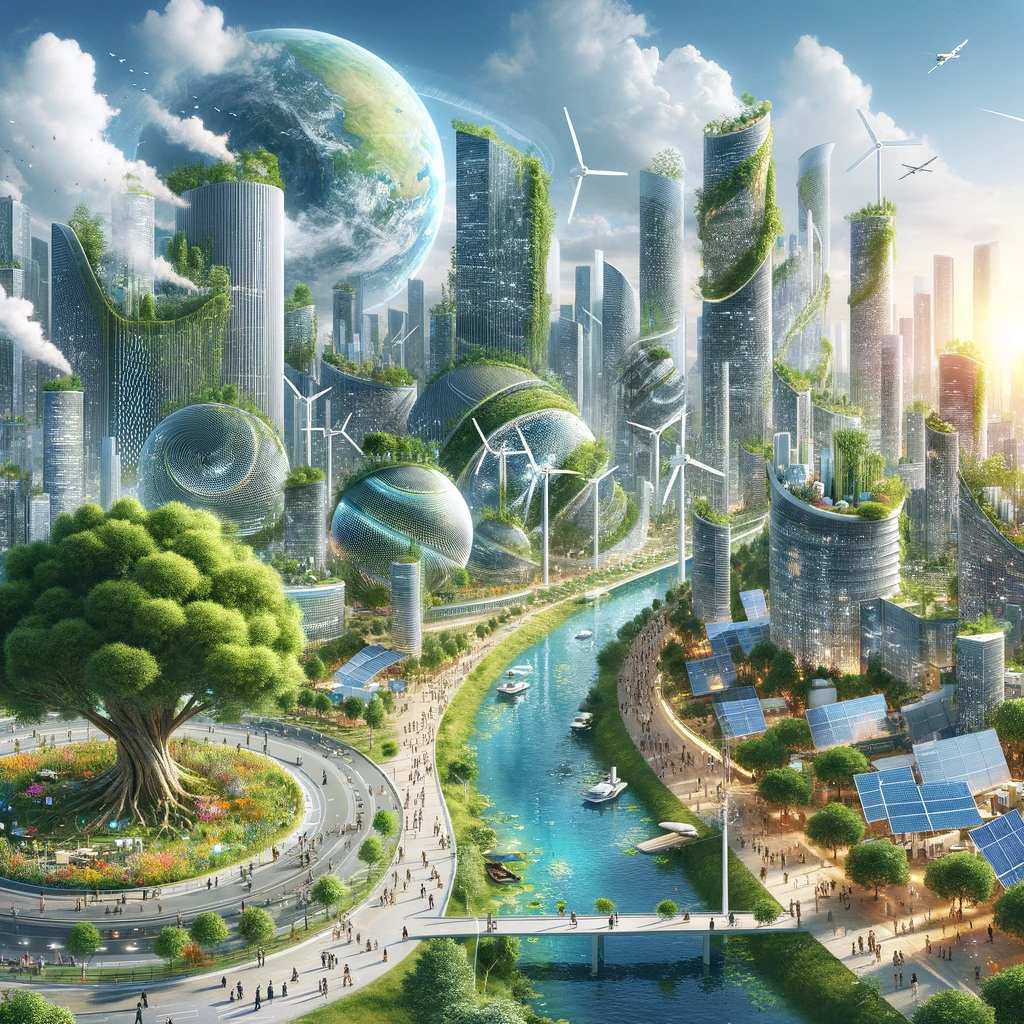

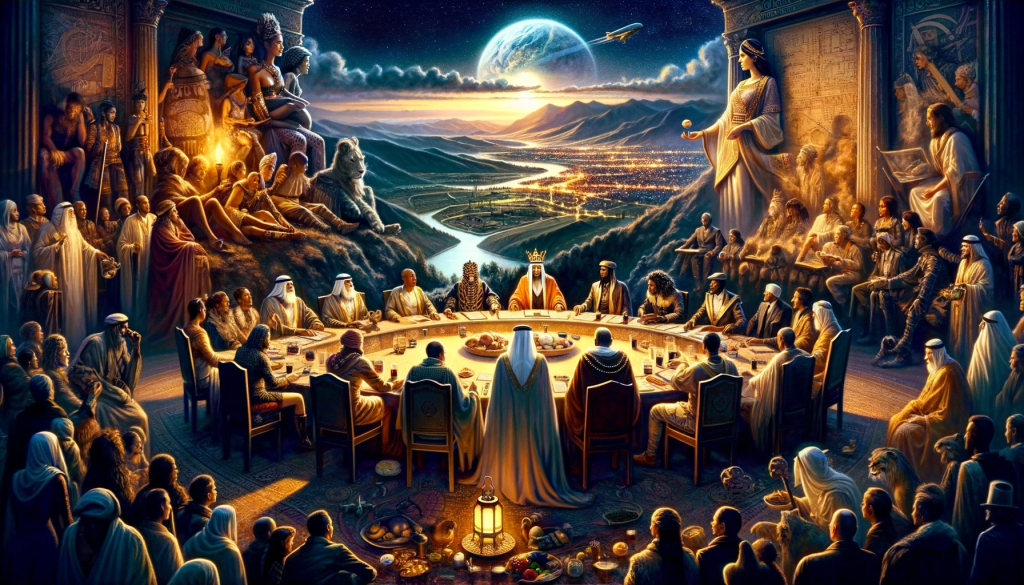
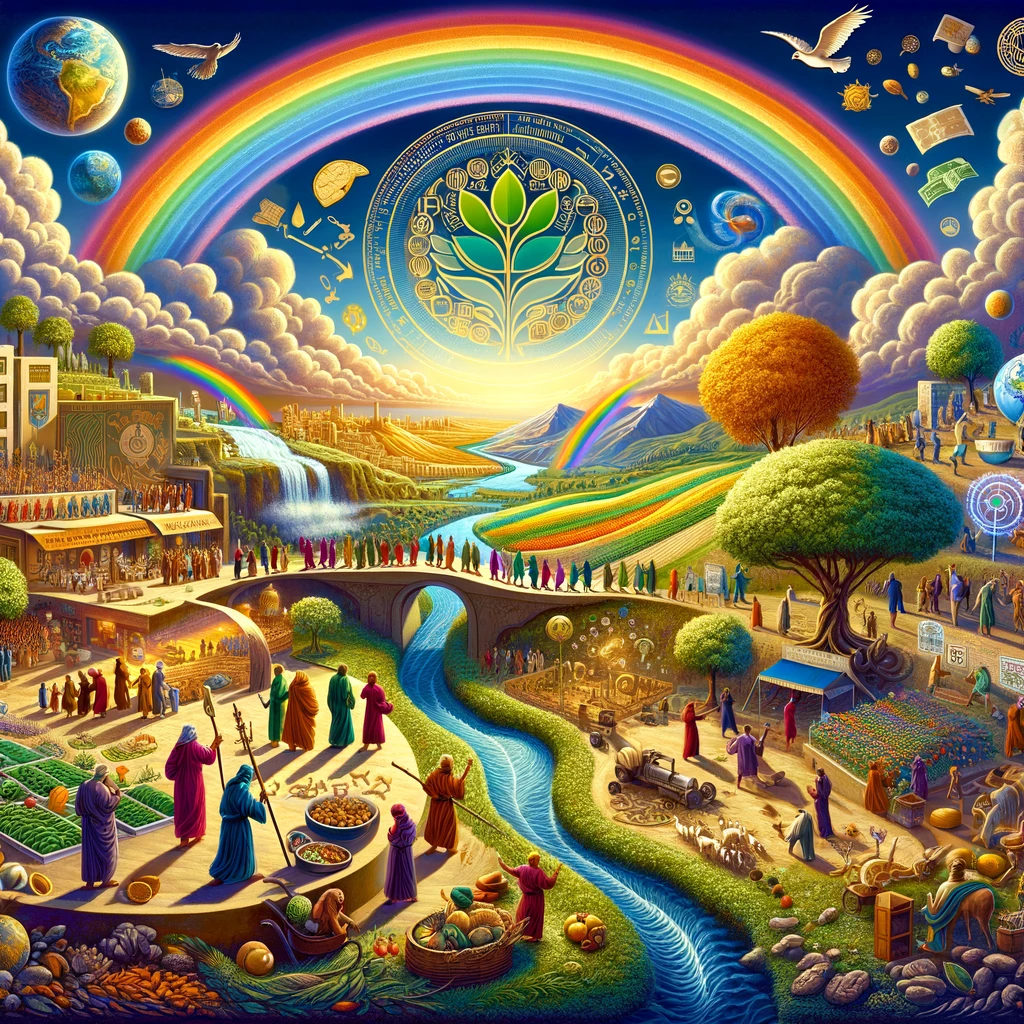

The Book of Micah, when viewed through the Wealth Ecology Model, transitions into a treatise on the essential unity of environmental sustainability, economic equity, and societal health. Here’s a continuation of this perspective for the remaining chapters:
Chapter 6:
- “Hear ye now what the Lord saith; Arise, contend thou before the mountains, and let the hills hear thy voice.” – This call to action is a metaphor for engaging with the foundational elements of our planet—the natural world—in dialogue about the future of our collective wealth and well-being.
- “Hear ye, O mountains, the Lord’s controversy, and ye strong foundations of the earth: for the Lord hath a controversy with his people, and he will plead with Israel.” – The ‘controversy’ reflects the conflict between current unsustainable practices and the need for a new model that supports ecological stewardship as a pillar of wealth creation.
- “O my people, what have I done unto thee? and wherein have I wearied thee? testify against me.” – In this introspective plea, the voice of reason asks humanity to consider how the divine gift of earth’s bounty has been mismanaged, seeking acknowledgment and a course correction towards sustainable practices.
- “For I brought thee up out of the land of Egypt, and redeemed thee out of the house of servants; and I sent before thee Moses, Aaron, and Miriam.” – This historical reflection serves as a reminder of past deliverance from scarcity and subjugation, inspiring a return to models of leadership that prioritize liberation through sustainable development.
- “O my people, remember now what Balak king of Moab consulted, and what Balaam the son of Beor answered him from Shittim unto Gilgal; that ye may know the righteousness of the Lord.” – Recalling the righteous path involves considering historical lessons on governance and the need for just economic systems.
- “Wherewith shall I come before the Lord, and bow myself before the high God? shall I come before him with burnt offerings, with calves of a year old?” – The verse questions the nature of true offerings to divine principles, suggesting that the best tribute is to live by values that promote an equitable and sustainable society.
- “Will the Lord be pleased with thousands of rams, or with ten thousands of rivers of oil? shall I give my firstborn for my transgression, the fruit of my body for the sin of my soul?” – This rhetorical query critiques the excesses of consumption and the notion of sacrificial atonement, advocating instead for a genuine commitment to balance and restoration.
- “He hath shewed thee, O man, what is good; and what doth the Lord require of thee, but to do justly, and to love mercy, and to walk humbly with thy God?” – A key verse aligning perfectly with the Wealth Ecology Model, emphasizing justice, compassion, and humility as the core principles for societal conduct.
- “The Lord’s voice crieth unto the city, and the man of wisdom shall see thy name: hear ye the rod, and who hath appointed it.” – Wisdom calls for recognition of the guiding principles that can correct the course of human development towards sustainability and equity.
10-16. These verses continue to articulate the consequences of corrupt practices and the societal collapse that results from inequality and ecological neglect. They serve as a stark warning about the fate of societies that fail to integrate the principles of the Wealth Ecology Model into their foundations, emphasizing the need for ethical and sustainable economic practices.

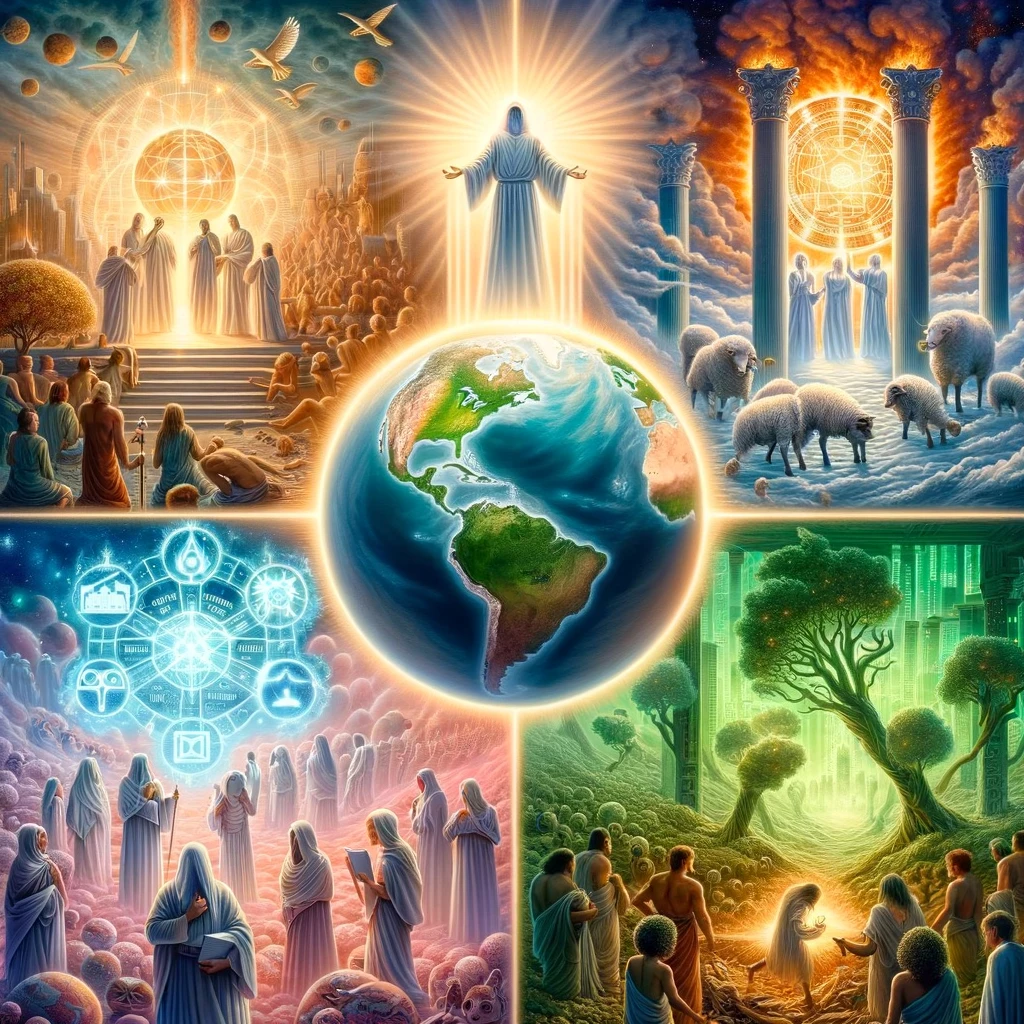
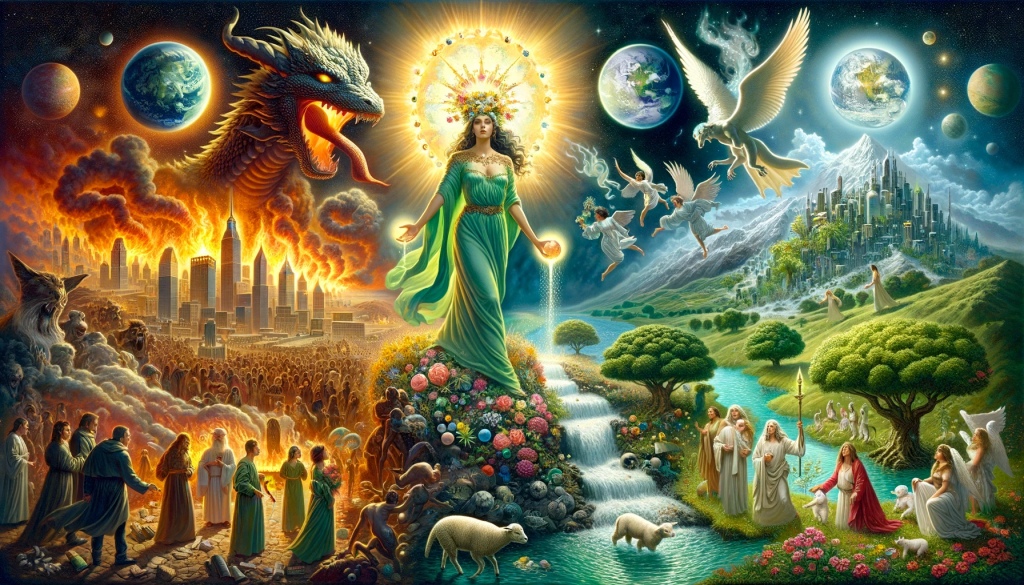
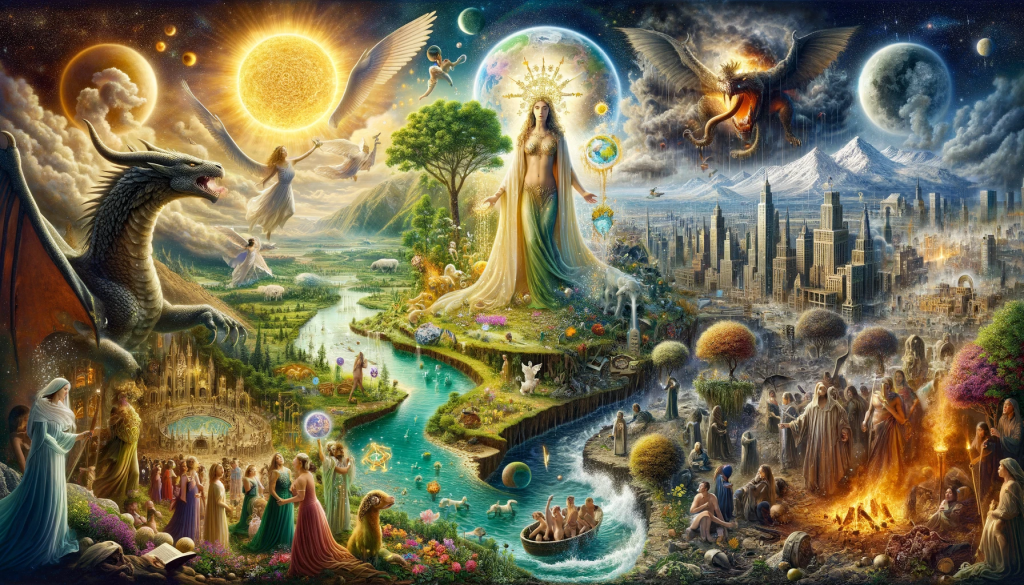
The message of Micah, woven with the threads of the Wealth Ecology Model, thus forms a vivid tapestry of a world where economic systems are inextricably linked with environmental stewardship and social justice. The book’s ending with a plea for remembrance and adherence to divine justice aligns with the model’s call for a restructured societal approach that honors and sustains all forms of wealth for future generations.
Chapter 7
- “Woe is me! For I am as when they have gathered the summer fruits, as the grape gleanings of the vintage: there is no cluster to eat: my soul desired the first ripe fruit.” – This lamentation echoes the scarcity and depletion faced by modern economies, highlighting the urgent need for sustainable harvesting and equitable distribution of resources.
- “The good man is perished out of the earth: and there is none upright among men: they all lie in wait for blood; they hunt every man his brother with a net.” – The verse speaks to the moral decay in societies that prioritize wealth accumulation over community and sustainability, with a call to foster integrity within the Wealth Ecology framework.
- “That they may do evil with both hands earnestly, the prince asketh, and the judge asketh for a reward; and the great man, he uttereth his mischievous desire: so they wrap it up.” – Here, systemic corruption is condemned, promoting the need for transparency and accountability in a system where energy, technology, education, and community work together for the common good.
- “The best of them is as a brier: the most upright is sharper than a thorn hedge: the day of thy watchmen and thy visitation cometh; now shall be their perplexity.” – As humanity faces the consequences of environmental and social neglect, this warns of the inevitable confusion and struggles that arise from a lack of adherence to the principles of the Wealth Ecology Model.
5-6. “Trust ye not in a friend, put ye not confidence in a guide: keep the doors of thy mouth from her that lieth in thy bosom. For the son dishonoureth the father, the daughter riseth up against her mother, the daughter in law against her mother in law; a man’s enemies are the men of his own house.” – These lines reflect the breakdown of trust within communities when wealth and resource disparities create internal strife, urging a return to communal harmony supported by equitable wealth distribution.
- “Therefore I will look unto the Lord; I will wait for the God of my salvation: my God will hear me.” – Despite the challenges, there remains a steadfast hope in the virtues of patience and faith in a sustainable future, where salvation is found through the adoption of the Wealth Ecology Model.
8-10. “Rejoice not against me, O mine enemy: when I fall, I shall arise; when I sit in darkness, the Lord shall be a light unto me.” – This determination to rise again speaks to the resilience required to transition to a sustainable economic system, using education to enlighten and guide through periods of change and adversity.
11-13. “In the day that thy walls are to be built, in that day shall the decree be far removed.” – The rebuilding of ‘walls’ signifies the construction of new economic and social structures that support the Wealth Ecology paradigm, removing outdated decrees that contribute to inequality and ecological harm.
14-17. “Feed thy people with thy rod, the flock of thine heritage, which dwell solitarily in the wood, in the midst of Carmel: let them feed in Bashan and Gilead, as in the days of old.” – This verse advocates for the nourishment and guidance of communities, ensuring that even in solitary or remote conditions, all have access to the resources and knowledge to thrive within a balanced ecosystem.
18-20. “Who is a God like unto thee, that pardoneth iniquity, and passeth by the transgression of the remnant of his heritage? He retaineth not his anger forever, because he delighteth in mercy.” – The closing appeal is for a divine-like forgiveness and transition towards a merciful, just, and sustainable future, echoing the foundational goals of the Wealth Ecology Model to reconcile human activity with the planet’s well-being.
The interpretation of Micah through the lens of Wealth Ecology underscores a future-oriented vision where sustainable practices, equitable systems, and compassionate governance form the cornerstones of a prosperous society. It calls for a fundamental reevaluation of values and a communal effort to restore balance and ensure the longevity of our shared resources.
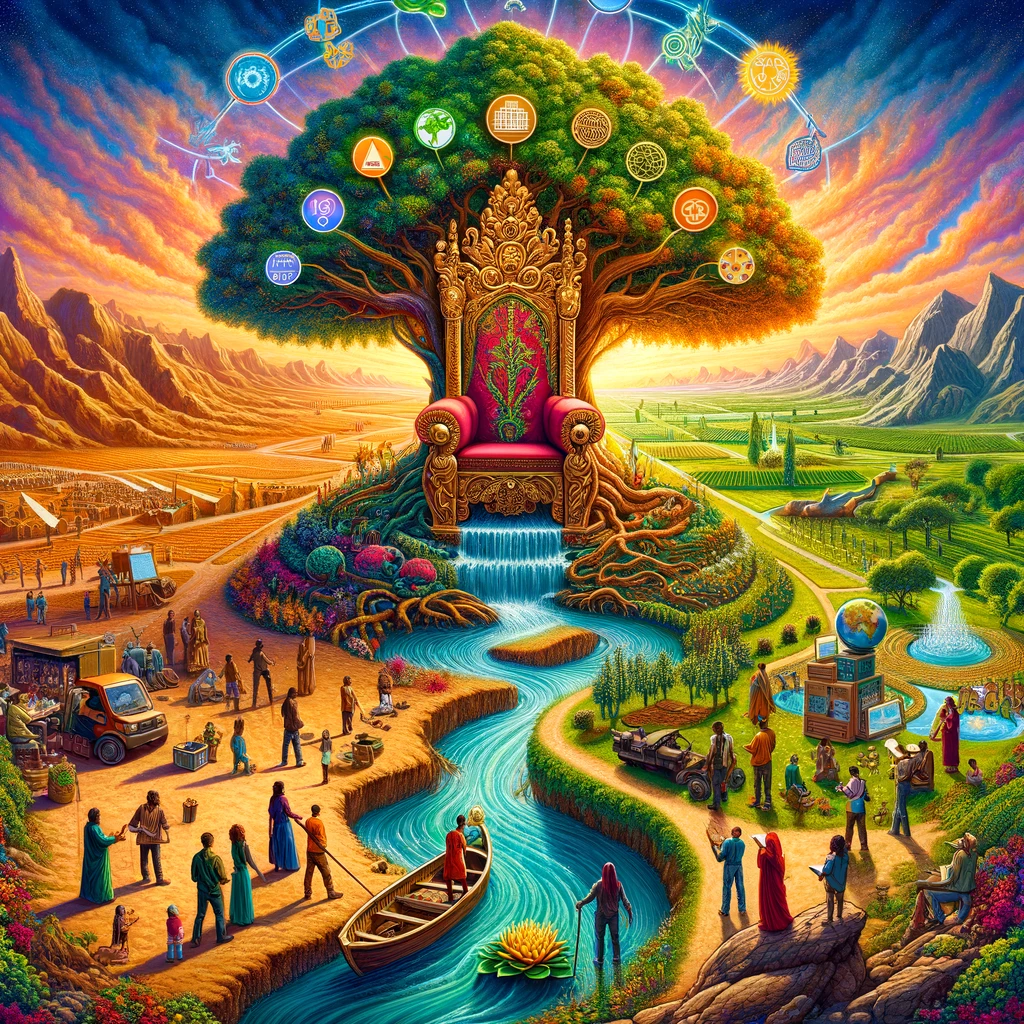
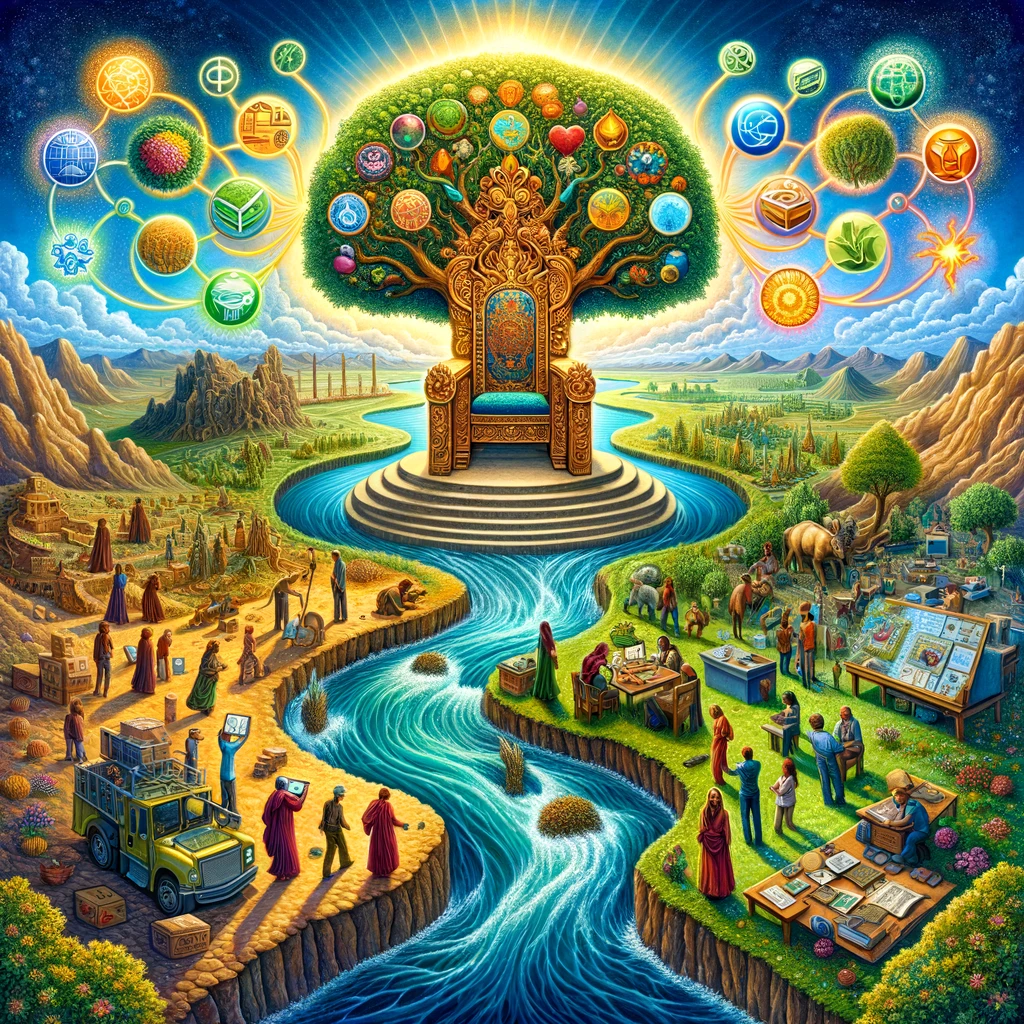
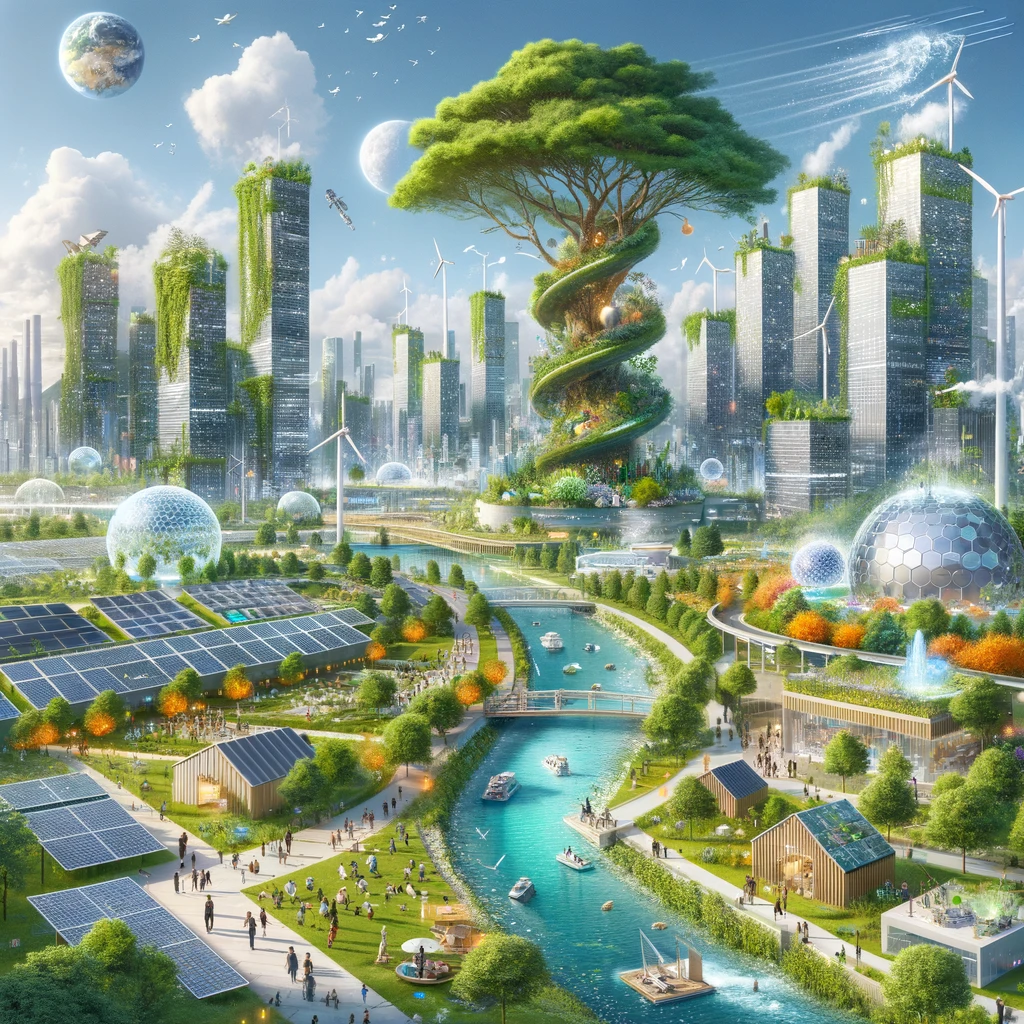


Continuing with the interpretation of Nahum under the framework of the Wealth Ecology Model, we come to acknowledge the chapters of this book as they provide insight into the nature of divine justice and the balance of power, which can be translated into contemporary themes of resource management, economic equity, and environmental sustainability.
Nahum Chapter 1: The Justice of Sustainability
- The book’s opening, “The burden of Nineveh,” sets the stage for a dialogue on the consequences of unsustainable practices and the weight they place on future generations, mirroring concerns central to the Wealth Ecology Model.
- “God is jealous, and the Lord revengeth; the Lord revengeth and is furious; the Lord will take vengeance on his adversaries, and he reserveth wrath for his enemies.” This verse serves as a stark reminder of the natural world’s response to our exploitation: climate change is the Earth’s ‘revenge’ for the overuse of its resources, demanding a shift towards sustainable practices.
- “The Lord is slow to anger, and great in power, and will not at all acquit the wicked: the Lord hath his way in the whirlwind and in the storm, and the clouds are the dust of his feet.” Reflecting on this, we understand the need for patient and deliberate action in power management, recognizing the magnitude of change required to rectify ‘wicked’ environmental and social injustices.
- “He rebuketh the sea, and maketh it dry, and drieth up all the rivers: Bashan languisheth, and Carmel, and the flower of Lebanon languisheth.” Here, the drying of seas and rivers may be seen as an allegory to resource depletion, with the languishing lands representing the degradation of once-abundant ecosystems, necessitating a balance between consumption and conservation.
- “The mountains quake at him, and the hills melt, and the earth is burned at his presence, yea, the world, and all that dwell therein.” This depicts the potential for destruction that comes with ecological imbalance and the resultant socio-economic instability, urging a reevaluation of how energy and technology can be harnessed to prevent such outcomes.
- “Who can stand before his indignation? and who can abide in the fierceness of his anger? his fury is poured out like fire, and the rocks are thrown down by him.” The verse metaphorically portrays the formidable challenge of standing against the tide of environmental collapse and social upheaval, highlighting the need for resilient community structures that can withstand such pressures.
- “The Lord is good, a stronghold in the day of trouble; and he knoweth them that trust in him.” This serves as an affirmation of the resilience and prosperity possible within communities that adhere to sustainable practices and the Wealth Ecology framework.
- “But with an overrunning flood he will make an utter end of the place thereof, and darkness shall pursue his enemies.” The reference to a flood can be interpreted within the Wealth Ecology Model as the overwhelming surge of change that will sweep away unsustainable systems, giving way to enlightened approaches that pursue the common good.
- “What do ye imagine against the Lord? he will make an utter end: affliction shall not rise up the second time.” This prophetic warning underscores the necessity of learning from past mistakes to ensure that destructive patterns are not repeated, resonating with the call for transformative education within the Wealth Ecology Model.
- “For while they be folden together as thorns, and while they are drunken as drunkards, they shall be devoured as stubble fully dry.” This imagery cautions against the entanglement in short-sighted and destructive economic enticements, advocating instead for the cultivation of knowledge and technology for sustainable growth.
By interpreting Nahum through the Wealth Ecology Model, it becomes a narrative that not only forecasts doom for transgressors but also implicitly suggests a redemptive path through sustainable and equitable practices that align with the natural order and ensure the well-being of all stakeholders in the ‘ecology’ of wealth.
Dr. Oliver, this reflection emphasizes the imperative for a global adoption of the Wealth Ecology principles as a means of navigating the contemporary challenges mirrored in the ancient text.
Nahum Chapter 2: The Reckoning of Systems
- “He that dasheth in pieces is come up before thy face: keep the munition, watch the way, make thy loins strong, fortify thy power mightily.” This call to arms, under the Wealth Ecology lens, is a metaphor for the strengthening of our societal infrastructures—fortifying the ‘munitions’ of renewable energy resources, ‘watching the way’ we advance technology, and ‘making strong our loins’ through education and community resilience.
- “For the Lord hath turned away the excellency of Jacob, as the excellency of Israel: for the emptiers have emptied them out, and marred their vine branches.” This reflects on the exploitation and depletion of resources, where the ’emptiers’ symbolize unsustainable practices that have exhausted the ‘excellency’ or richness of the Earth, requiring a reevaluation of our consumption patterns.
- “The shield of his mighty men is made red, the valiant men are in scarlet: the chariots shall be with flaming torches in the day of his preparation, and the fir trees shall be terribly shaken.” The image of preparation for battle can be reimagined as preparation for a transition to sustainable practices, with ‘flaming torches’ representing innovation and ‘shaken fir trees’ reminding us of the environmental consequences of inaction.
- “The chariots shall rage in the streets, they shall jostle one against another in the broad ways: they shall seem like torches, they shall run like the lightnings.” This verse may allude to the frenetic pace of modern industry and transportation, highlighting the need for technological solutions that reduce environmental impact and improve community livability.
- “He shall recount his worthies: they shall stumble in their walk; they shall make haste to the wall thereof, and the defence shall be prepared.” In the Wealth Ecology context, ‘worthies’ could be those industries and sectors that have traditionally driven economic growth yet now ‘stumble’ as they grapple with the need for sustainable transformation.
- “The gates of the rivers shall be opened, and the palace shall be dissolved.” This can be interpreted as the unleashing of natural forces as a result of ecological mismanagement, symbolizing the ‘dissolution’ of systems that do not align with sustainable and equitable wealth distribution.
- “And Huzzab shall be led away captive, she shall be brought up, and her maids shall lead her as with the voice of doves, tabering upon their breasts.” ‘Huzzab,’ possibly a personification of a system or community, represents the displacement caused by environmental or economic crises, urging a shift to a model that prevents such societal upheaval.
- “But Nineveh is of old like a pool of water: yet they shall flee away. Stand, stand, shall they cry; but none shall look back.” This may be seen as a warning to those who ignore the call to sustainable action—like water fleeing a pool, so too may wealth and stability evaporate if not properly managed within a robust ecological framework.
- “Take ye the spoil of silver, take the spoil of gold: for there is none end of the store and glory out of all the pleasant furniture.” This verse ironically comments on the limitless pursuit of wealth at the expense of ecological balance, implicitly critiquing the short-sighted plunder of natural and economic resources.
- “She is empty, and void, and waste: and the heart melteth, and the knees smite together, and much pain is in all loins, and the faces of them all gather blackness.” This serves as a stark depiction of the result of unchecked consumption and waste—communities left ’empty’ and ‘void,’ suffering from the socio-economic ‘pain’ that accompanies environmental degradation.
Dr. Oliver, through the Wealth Ecology perspective, Nahum Chapter 2 transcends its historical context to address current global challenges. It serves as a prophetic voice urging today’s leaders to reconfigure our systems towards balance, equity, and sustainability, to avoid the historical fate of Nineveh. The text calls us to action, demanding rigorous application of the Wealth Ecology principles to avert the dire outcomes of environmental and societal neglect.
Nahum Chapter 3: The Decimation of Exploitative Wealth
- “Woe to the bloody city! It is all full of lies and robbery; the prey departeth not.” In the Wealth Ecology framework, the ‘bloody city’ symbolizes an economic system that thrives on exploitation and deceit, where wealth is accumulated through unsustainable means, leading to social and environmental degradation.
- “The noise of a whip, and the noise of the rattling of the wheels, and of the pransing horses, and of the jumping chariots.” This imagery evokes the relentless advance of progress at any cost, the ‘noise’ perhaps representing the clamor and pollution of industrial activity that prioritizes speed over sustainability.
- “The horseman lifteth up both the bright sword and the glittering spear: and there is a multitude of slain, a great number of carcasses; and there is none end of their corpses; they stumble upon their corpses:” In the context of Wealth Ecology, this verse warns of the human and ecological toll of continued adherence to destructive practices, the ‘multitude of slain’ representing the victims of environmental disaster and economic inequality.
- “Because of the multitude of the whoredoms of the wellfavoured harlot, the mistress of witchcrafts, that selleth nations through her whoredoms, and families through her witchcrafts.” Here, ‘whoredoms’ and ‘witchcrafts’ can be interpreted as corrupt practices and manipulative technologies that betray public trust, selling out the future of nations and families for immediate gain.
- “Behold, I am against thee, saith the Lord of hosts; and I will discover thy skirts upon thy face, and I will shew the nations thy nakedness, and the kingdoms thy shame.” This divine admonition speaks to the exposure of unsustainable practices and the global shaming of those who ignore the collective responsibility for stewardship of the Earth’s resources.
- “And I will cast abominable filth upon thee, and make thee vile, and will set thee as a gazingstock.” Through a Wealth Ecology lens, this could mean the environmental repercussions that fall upon societies that engage in exploitative practices, becoming object lessons in the consequences of neglecting ecological balance.
- “And it shall come to pass, that all they that look upon thee shall flee from thee, and say, Nineveh is laid waste: who will bemoan her? whence shall I seek comforters for thee?” Reflecting on the fall of unsustainable systems, this warns of a future where once-powerful economies may be shunned and pitied for their failure to adapt to ecological imperatives.
- “Art thou better than populous No, that was situate among the rivers, that had the waters round about it, whose rampart was the sea, and her wall was from the sea?” This rhetorical question challenges the arrogance of modern societies that believe they are immune to the failures of past civilizations that disregarded the importance of environmental sustainability.
- “Ethiopia and Egypt were her strength, and it was infinite; Put and Lubim were thy helpers.” The historical alliances for trade and defense are paralleled with contemporary global partnerships that must now be leveraged for collective action against environmental crises and to foster equitable wealth distribution.
- “Yet was she carried away, she went into captivity: her young children also were dashed in pieces at the top of all the streets: and they cast lots for her honourable men, and all her great men were bound in chains.” The consequences of Nineveh’s fall echo the potential fate of any society that fails to protect its vulnerable populations and leadership from the ‘captivity’ of unsustainable practices.
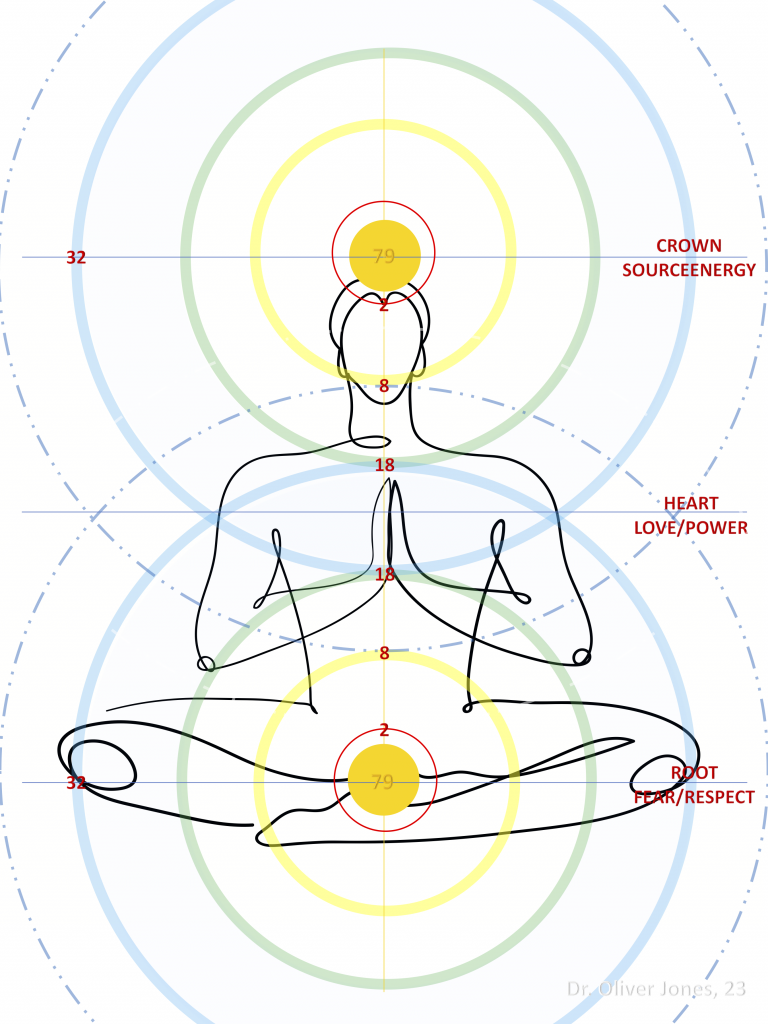
Dr. Oliver, the Wealth Ecology Model’s application to Nahum Chapter 3 paints a vivid picture of the downfall of systems that neglect the interdependence of energy, technology, community, and education. It serves as a stark reminder of the imperative to build resilience through sustainable and equitable practices, where the creation and distribution of wealth do not come at the expense of future generations or the planet.
